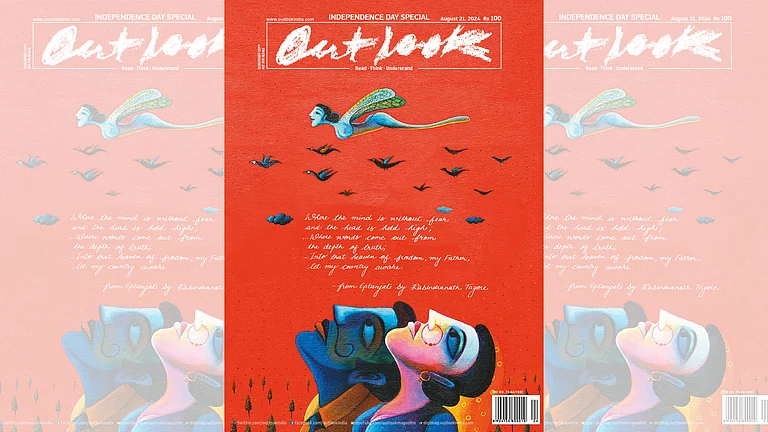FAMOUSLY, in 1993, in a moment of rare inpiration ignited by a brace of double hundreds against pathetic England, striding out of the gigantic shadow cast by his schoolmate Sachin Tendulkar, Vinod Kambli attempted to set his success in perspective. Sachin took the elevator, he said, and I the stairs. It was then, in the immediate afterglow of his Bradmanesque run, that I met him in Delhi, in pursuit of a story exploring the visceral connections between two top talents who had emerged from the wrong side of the street to dominate high profile, posh sports. The sportsman I was clubbing with Kambli was Ali Sher. A caddy in his origins, Ali Sher had just become the first Indian golfer to win the Indian Open twice.
Though the distances they had travelled were similar, the differences between the two were glaring. Ali Sher had just won the largest single purse by an Indian sportsman—Rs 10 lakh—but when I met him he was catnapping on a string charpoy at the cycle shed in the Delhi Golf Club, surrounded by scattered caddies playing cards. I met Kambli a few 100 feet away; but, in contrast, at the Oberoi, packing fancy kit bags. Later when I got them together on the fairway for the photo-session, it was clear who the star was. Kambli did not know of the golfer, but slowly grew pleased at discovering him; on the other hand, Ali Sher and his fellow caddies displayed a childlike joy at having the celebrity cricketer in their midst.
Even as he made the ace golfer's acquaintance discussing grips and swings, for the first time since I had met him, I saw Kambli visibly relax. For the two days I had been meeting him, his struggle to fashion a public persona, to present an image that the media man would deem appropriate and then effectively broadcast, had been painfully evident. By turns he was standoffish and 'cool'. Very tense about what he was saying, and how he was saying it. This was in complete variance to what I had heard about him: that he was a spontaneous, fun-loving guy. Sachin was meant to be the focused genius; Kambli's was the swashbuckling talent. But at the time, he was trying to come to terms with being a superstar, trying to imagine—and then be—what a superstar ought to. And herein lay the great difference between Ali Sher and him: while the golfer was very comfortable in his own skin, Kambli was not. Ali Sher could play with the sahibs, beat them, have tea at their club-house and go home to his friends and family without feeling the need to become a sahib. He had been let into an elite coterie for the length of the fairways, and he was grateful: he had little locus standi to enter their living rooms, and perhaps little desire to.
Kambli on the other hand had travelled light years from being a machinist's son to being the hero of millions, adulated by rich and poor alike, splashed over newsprint and television screen; and his screeching progress was resulting in torque. Among sports and film stars, this is not an unfamiliar syndrome. The combination of crazed fans, fancy cars, deluxe hotels and pretty girls can be very giddy, and it is the rare individual who can keep his head. The neurotic shut out life and concentrate purely on their performances; the wastrels sweep aside their gift and sink into the pleasure perks it has brought them; but most manage to balance their indulgences and their talent in fulfilling ways. Kambli had begun to wrestle with the two, but there was no reason to suppose he would not.
But as it turns out we have made a mess of it. For reasons that can only be guessed at, the Indian selectors have been toying with his career. It is outrageous that someone of his talent, and with the numbers to back it—an average of over 40 in one-dayers, and over 50 in Tests: in India only Sachin matches that—has been dropped from three successive tours. Worse, in an appalling display of the idiotic megalomania that seizes sports administrators who invariably deem themselves to be more important than the players, the selectors have not even bothered to explain the reasons for his omission. In fact in a particularly grandiose statement, Gundappa Vishwanath, chairman of the selectors, actually said that Kambli's name had not even come up for consideration. How do you not even consider one of the best young batsmen in the world, while actually carting along the likes of Rahul Dravid, Vikram Rathore and Saurav Ganguly? By including the last, the selectors have truly displayed their consummate arrogance.
So, clearly, Kambli is out for reasons other than cricket. Will someone please tell the paying, praying public what these are? Indiscipline, the sports journalists have been hinting, but why don't they spell it out? If it is out of a sense of loyalty to the players, then it is misplaced. The Kambli omission is a good journalistic story, of public interest, and should be aired. The grapevine seems to suggest womanising is the problem. If that is true, is it unique unto him? And does it really matter as long as it doesn't interfere with his game? Magic Johnson in his autobiography wrote about the lobbies filled with beautiful women who would await the L.A. Lakers at every hotel when they travelled. Most of the women were unbelievably desirable, Magic wrote, and the players could sleep with any of them. Magic's own favourite fetish, he admitted, was to get together with two women from different towns. None of this kept Magic from being one of the most spectacular athletes on the planet, a multi-million dollar earner. And the NBA is full of such players. As for the physical demands of the game: if Test cricket seeks a fitness of 10 on 100, top level basketball requires 90. If Kambli is being punished on moral grounds alone, it is a very unfair yardstick by which not only most sportsmen, but most people, fail.
What Kambli needs above all is good counselling. And this is what some white hair in the Board should be doing. Someone should be explaining to him the tightrope all great achievers have to walk between responsibility to their talent and the indulgences it brings them as reward. Sportsmen have short careers, of eight to 10 productive years. To deprive them of a few, on whimsical grounds, is truly callous. No one should take offence if a machinist's son displays attitude by sporting earrings or playing pranks: the rigours of a long journey can leave strange scars, the need to make all kinds of statements, the incessant fumblings to forge an identity. What must be remembered is that he has made the journey fuelled by talent alone. And talent, in any field, is rare; it ought to be fostered and respected.


























